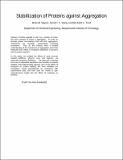| dc.contributor.author | Baynes, Brian M. | |
| dc.contributor.author | Wang, Daniel I.C. | |
| dc.contributor.author | Trout, Bernhardt L. | |
| dc.date.accessioned | 2003-12-16T14:27:26Z | |
| dc.date.available | 2003-12-16T14:27:26Z | |
| dc.date.issued | 2004-01 | |
| dc.identifier.uri | http://hdl.handle.net/1721.1/3950 | |
| dc.description.abstract | Proteins degrade in vitro by a variety of routes, the most common of which is aggregation. In order to develop protein formulations that will limit aggregation, researchers use heuristic, experimental screening procedures. They do this because there is limited understanding of the mechanisms of aggregation and of the molecular-level effects of excipients (additives) on proteins and on protein reactions.
In this study, we modeled the effects of some common solution additives– glycerol, urea, and arginine– via molecular dynamics simulation. The approach presented here uses no adjustable parameters and provides a uniquely detailed, thermodynamically rigorous view of the effects of excipients on protein stability. We have validated our simulations results quantitatively by comparing with experimental data, and have used our results to gain molecular-level insight into the effects of excipients on proteins. | en |
| dc.description.sponsorship | Singapore-MIT Alliance (SMA) | en |
| dc.format.extent | 11336 bytes | |
| dc.format.mimetype | application/pdf | |
| dc.language.iso | en_US | |
| dc.relation.ispartofseries | Molecular Engineering of Biological and Chemical Systems (MEBCS); | |
| dc.subject | aggregation | en |
| dc.subject | in vitro protein degradation | en |
| dc.subject | excipients | en |
| dc.subject | protein stability | en |
| dc.title | Stabilization of Proteins against Aggregation | en |
| dc.type | Article | en |
